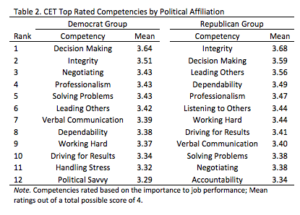Political passions are running white-hot in the United States right now. Between Supreme Court nominations, immigration, racial issues, and health care, both sides of the political spectrum are fighting fiercely to win. It’s easy to believe we’re more divided than ever.
With so much at stake, you’d hope the most qualified candidates would rise to the top. Let’s just say that doesn’t always happen. Far too often, people will elect candidates with low qualifications, unworkable ideas, and downright questionable mental capabilities such as (insert the name of an elected official you personally don’t like here).
Since analyzing job fit is what we do, we started wondering what the ideal characteristics of a successful, generic, non-partisan politician would be. However, researchers have produced few studies examining work-specific personality aspects of U.S. politicians, and we didn’t want to just dictate our idea of the ideal politician. This is a democracy, after all.
That’s why Hogan researchers Michael Tapia and Chase Winterberg turned to the American people. The two set out to determine what characteristics and competencies the public wanted from politicians in general, and whether they varied by political affiliation. To do that, they surveyed people about their perception of an ideal politician using Hogan’s Job Evaluation Tool, which incorporates the full spectrum of personality scales we use to predict work-related performance.
Long story short, the study found there’s not a big difference between Democrats and Republicans when it comes to their preferred characteristics of elected officials. Both parties associated high political job performance with high scores on Ambition, Interpersonal Sensitivity, Prudence, and Learning Approach. Participants identified Imaginative and Dutiful as top elected official derailers. Commerce, Power, Affiliation, and Science were voted the top values for elected officials.
Overall, Republicans and Democrats showed an 83% overlap over the top-12 rated competencies. Though there are some differences, the strong overlap is a powerful contradiction to the perceived differences in today’s political arenas. Despite the widening political divide, we feel it is possible to create a universal standard for judging elected official job fit.

But if that’s the case, why can’t Democrats and Republicans agree on, well, anything? Tapia and Winterberg argue that gulf arose due to a political system that ignores job-related competence and focuses on conflict rather than resolution. Would showing the public there’s a clear consensus on the ideal politician personality help close that gap? If nothing else, it’s more productive than arguing politics with strangers on the Internet yet again.